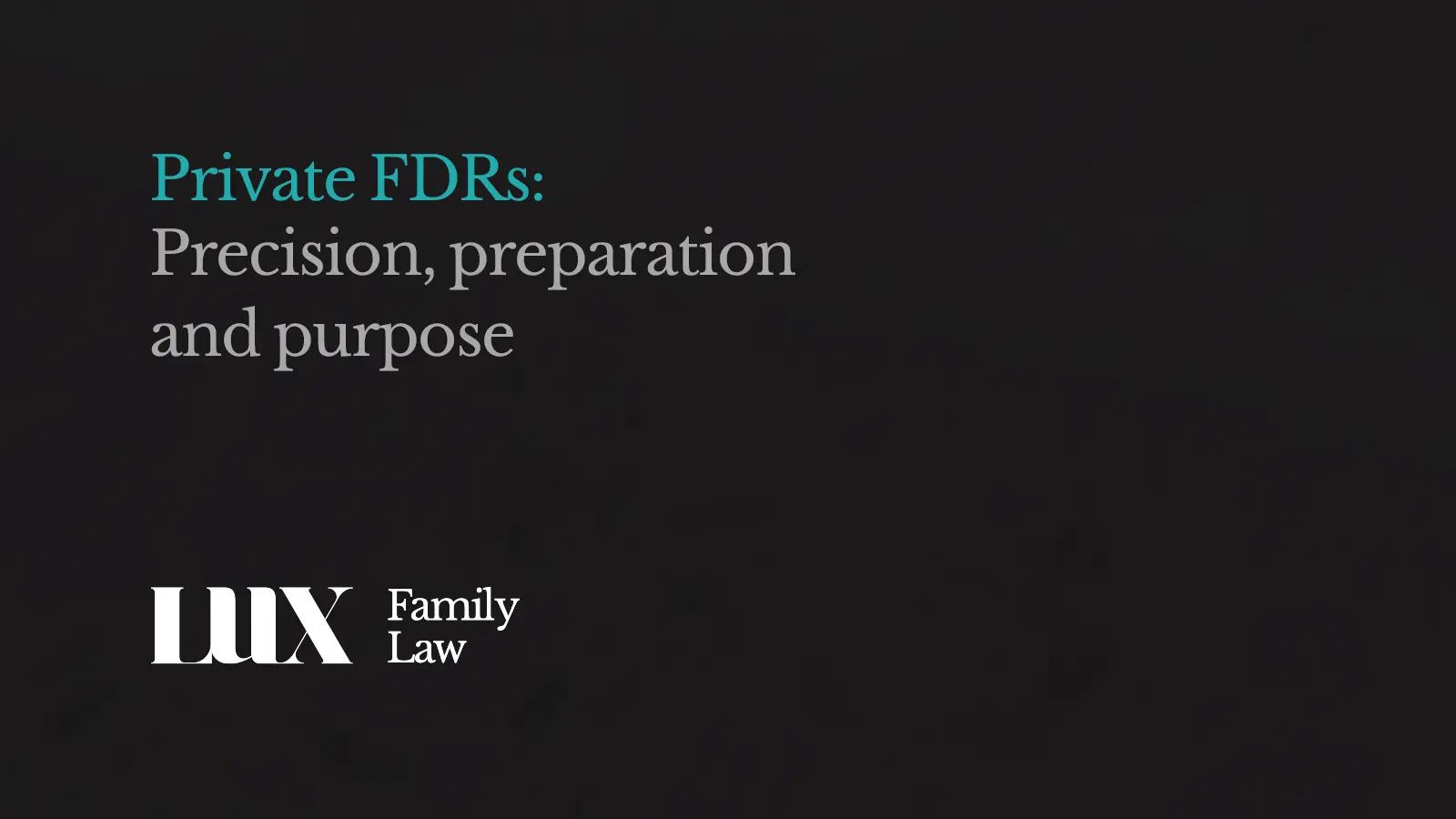Private FDRs: Precision, preparation and purpose

I recently attended a private Financial Dispute Resolution (FDR) hearing in London and came away with a renewed appreciation for what this process can achieve when done well. The experience has prompted me to reflect on the value of private FDRs and their potential place in the legal landscape of Wales.
What is a private FDR?
A private FDR mirrors the court-based FDR process but is conducted outside the court system. The parties jointly instruct a family law specialist, often a senior barrister or retired judge, to provide an indication on the likely outcome of the case if it were to proceed to trial. Unlike in court, the appointed evaluator is paid for their time. They are given the opportunity to read the papers in advance and dedicate the full day to the matter. The hearing itself typically takes place in a neutral, comfortable venue (usually Chambers or a solicitors’ office).
What sets a private FDR apart?
In our recent case, the difference lay not only in the quality of the indication but in the atmosphere and structure surrounding it. Our ‘judge’ had sufficient time to absorb the papers and offered a carefully reasoned and balanced view. With a full day set aside, and no competing demands, the setting allowed for measured discussion and meaningful engagement. The clarity of the indication helped both parties focus on resolution, rather than position. There was no space left for the usual dispute over whether the indication was too generous to one side or lacking in rigour. The authority and clarity of the judgment spoke for itself.
By contrast, a recent court-based FDR I attended in Wales unfolded in a far more pressured environment. The judge, managing a full list, noted that there had been limited opportunity to absorb the bundle in depth. That is entirely understandable given the volume of work and the pace at which matters are often listed. It reflects not on the judge, but on the realities of working within a busy court system. While the listing was prompt (as it often is in Wales) the constraints of the setting meant that the same time and space for detailed engagement simply were not available.
The true value lies in the quality of the indication
There is a common view in Wales that private FDRs are not necessary because court-based FDRs are listed without much delay. While it is true that the speed of listing is better than in some parts of England, that should not be mistaken for a guarantee of quality. A prompt FDR is of limited use if the judge has not been able to engage fully with the case. A private FDR, on the other hand, ensures that the evaluator has fully read in and has the time to provide a comprehensive indication. That indication is more likely to be accepted and acted upon because both parties can see that it has been carefully considered.
When a judge has the time to understand the issues in depth, the parties receive a realistic view of their likely prospects at trial. That helps reduce positional thinking and encourages pragmatic negotiation. The better the indication, the greater the likelihood of settlement.
Are private FDRs worth the cost?
Parties must pay for the evaluator’s time and there may be additional expenses for the venue or preparation. However, the value of what is received in return should not be underestimated. A well-considered, carefully delivered indication can bring clarity to both parties, often leading to early settlement. When measured against the cost of preparing for and attending a final hearing (including barristers’ fees, court time, and the emotional toll of drawn-out proceedings) the cost of a private FDR is often modest.
In my experience, when the indication is thoughtful and robust, parties are more inclined to resolve matters on the day or shortly afterwards. That can prevent months of additional litigation and the financial and emotional strain that comes with it. Viewed in that light, a private FDR is not just an additional cost but a strategic investment.
A call to action for Wales
Private FDRs are not just a solution for delays. They are a route to higher quality and quicker resolution. That is in all parties’ interests. If we can promote their value in Wales, we should. The infrastructure is already in place and we have access to experienced family law practitioners who can act in this role. The question is not whether we need private FDRs because of court delays, but whether we want our clients to benefit from a more rigorous, efficient and effective form of dispute resolution.
If the aim is to encourage settlement, reduce litigation and achieve fair outcomes, private FDRs offer a powerful tool. Wales should not be left behind.